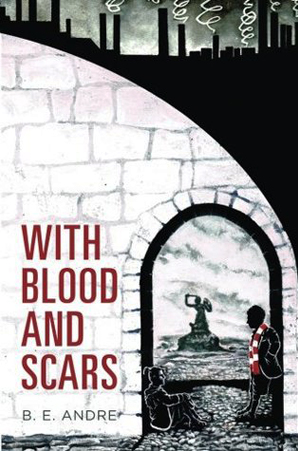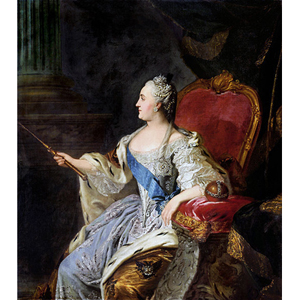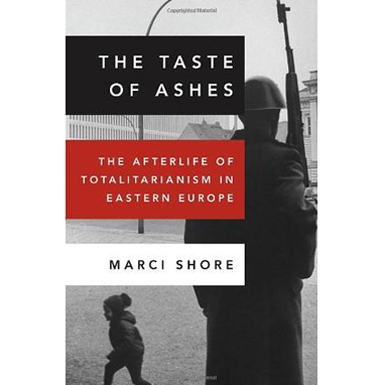The week I interview Bozena Andre, the Guardian publishes, “Study of Holocaust Survivors Finds Trauma Passed on to Children’s Genes.” Her novel, “With Blood and Scars,” deals with just that: The trauma of WW2 survivors. Their children. I email her the link asking if she’s read it.
She has, of course. And says she’s been discussing it with Poles who’d like to see a similar study that focuses on them. Except their stories are not nearly as known – especially those who were deported to Siberia en masse by Stalin once he and Hitler carved up Poland in 1939.
A former Reuters journalist, she’s fast-spoken, curious, open – and just as interested in asking me questions as I am her.
I tell her that her novel’s narrative – told through a child’s eyes, a child that speaks Polish at home yet English everywhere else, attends Polish school on Saturdays and Polish camp in the summertime – is one achingly familiar to me, though we live on different sides of the ocean, and come from different generations. But we’re both children of proudly Polish immigrants, raised on non-Polish soil with a keen interest in exploring our specific, and as it turns out – very universal – experiences.
Our conversation, edited and condensed for clarity, is below.
* * *
You and your book family butt up against huge historical moments. Did you have any idea, as a child, that your family had experienced these things?
That was a reason I wrote the book. When doing my Master’s in Creative Writing, I thought, what could I write that I felt passionate about? I looked at some Polish-American literature and couldn’t find anything that reflected my experience. Or the experience of anybody around me in the U.K.
Anybody from 1945 – 1975 lived with that history. Going to Scouts and the Polish Club. For me the biggest shock was when my parents took me to Auschwitz. I was 11. I know they had their reasons for taking me. But I was too young.
I wanted to have this full history of Poland throughout the book. Part of my challenge was to drop in bits of history, to have it in there without being intrusive.
In the same way – I’m not comparing myself here – in To Kill a Mockingbird, a serious theme was explored through the voice of a child. That’s what I wanted to do: explore a serious theme but not make it so miserable that people felt drained at the end. It had to have some humor. While I very much want this story to be known beyond Polish circles, I didn’t want to hit non-Polish readers over the head.
When did you realize that you were part of something bigger than what was happening in your own home?
It definitely was when I went to Auschwitz. And there were programs on TV about WWII. English schoolchildren – they would see something going on in Europe but they didn’t have the sense of Europe that we Poles had. It was an unknown place [to them]. Did you go to Polish school?
We did. Polish school, and Polish Scouts, and so I laughed when you wrote that bit about “Zielony Walczyk” and “Mam Chusteczke Haftowaną,” because we danced those too. These things kept going generation after generation.
And crossed continents.
I very much identified when little Ania says, “I hate being Polish.” It feels terrible to say that now. But it seems that we had a heavy burden my American friends didn’t have. When martial law was declared we had a tiny Christmas tree. My mum said it was because Poland wasn’t free. And that made no sense to us kids! But we were caught up in events much bigger than us, and so different than what our American school friends are dealing with.
It doesn’t matter if you’re in the States or Australia. It even doesn’t matter what generation. This is something that’s so universal.
The father character is fascinating. He’s so many different people in one. He’s kind. He’s angry and filled with Memories. In the novel, the mother says, he doesn’t drink to forget. He drinks and remembers.
I worked hard on him. I did want to show what we experience – the epigenetics as in the Guardian article – is only a part of who we are. He looks like a tyrant. He has a temper. But these are things that flare up in him. The baseline of this character is a decent person who cannot cope with a lot of emotions.
The reader then discovers why. It was difficult to show the reader what the child was seeing / experiencing – an unreliable narrator. I wanted to show every side of him I possibly could – the good, the bad. And also his patriotism. Which is very difficult to explain to someone who has not lost their country: “Why don’t you get on with life? You’re here now.”
Little Ania has a crisis because Stevo’s dad is Polish. What’s that about?
As children, we were taught that all Polish people were invariably noble and decent. And of course, Polish people are just people. They’re not particularly noble, or not particularly evil. They are people who are flawed. They are bad people and good people.
Auntie Tereska talks about the Warsaw Uprising: “It was an enormous victory but not a successful one.”
My own father was in the Uprising. That’s always been the question: Did the Uprising have any chance of being successful? There wasn’t really any question that the Russians would come in and save the day. It seems to me that it was an act of desperation not properly thought out. But they kept it going for 63 days.
I go back and forth. I think, that’s an entire generation lost. We lost so many leaders – both male and female. But then on the other hand, I think it was an act of abject desperation. They felt: We have nothing to lose. I’ve talked to people who fought in it – some say they would do it again, others that they wish they hadn’t.
It depends where you were and what happened to you. Because so many people were young, there was an adrenaline about it. It was scary but it was a time for bonding. They were brought together by something terrible.
I’ve certainly never had anything like that in my life. And so when some of the veterans say, It was beautiful, I understand that. Even though they saw so many terrible things.
Why a novel versus a memoir?
I felt that if I wanted to tell the story to a wider audience, I would need to do it as a novel. A memoir is different. It doesn’t push you in the same way.
I think about how to tell these stories, which are very complex. Communist propaganda suppressed them, of course. But I also think that Poles can get mired in details.
Somebody complained to me that I had not included enough details in one scene. But either I have a story or I have an encyclopedia.
I once had a gentleman mark up an article I’d written to add so many details. I understood why they were important to him. But I write for an American audience, which has little idea about any of this. And I have to step back and do a 30,000 foot view, otherwise I’ll have no audience.
You’ve got to push the story along.
What’s next for you on the writing front?
I have a couple of things on the go, but they’re more commercial than “With Blood and Scars.” People who have read WBAS have asked when the next one’s coming out. The next one that I’ve got will be nothing like it.
The Polishness is something I feel passionate about, and get into very easily. Not a prequel / sequel, but something about the Polish-English connection. That’s something that’s obviously so deep within me.
CR
JOIN IN the discussion on Bozena’s Facebook page.
And here’s more INFO on the book.





Pingback: Welcome to Fall 2015!